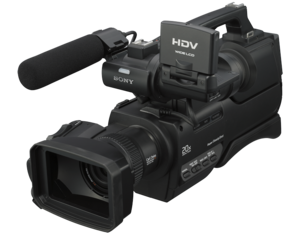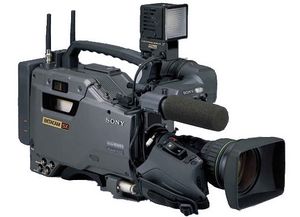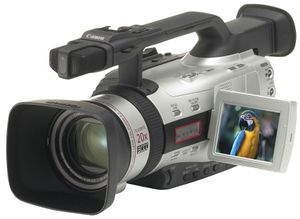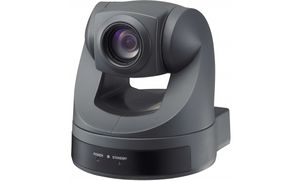Cameras
Basic use of the cameras. See the rest of the Camera Tutorial for the process of filming with our cameras:
- Camera Checklist - Also has a list of rarely-used terminology.
- Setting Up a Shot - Including framing, white balance, exposure, focus etc.
- How To Interview - Does. Says. Tin.
- Setting up Sound - Because it makes more difference than you'd think.
- Sony HDV Camera Operation Guide - A more detailed guide to using the Sony HD cameras.
- FAQ - Common issues using a camera - Fill it in as you make mistakes!
- Using the dolly - Rolling around allows you to make some incredible shots.
Main Cameras
- For YSTV's older, retired cameras, see the talk page.
Sony HVR-HD1000E
- HD for live and pre-recorded filming
Our current flagship cameras - record at 1440x1080i50 (anamorphic) onto HDV tape for capture, and do live video out over HDMI or Composite. Many student TV stations would be lucky to have one of these - we have three (they and the associated tripod, lamp, (wired?) remote control, and bag were donated with money from the Alumni Fund). For full usage instructions, see the user manual online or in the Documents drive.
They have a good set of functions, setup by a touch screen and controlled during use by buttons and a fly-by-wire ring. We currently use them in preference to all our other cameras for pretty much everything.
During their use at Woodstock 2009 the video out and umbilical were dangling directly from the composite socket for some of the show. The weight of the umbilical and the movement of the camera damaged the composite sockets of two of the cameras. These were re-soldered to the circuit board in the Easter vacation of 2010. The previous solution was to use an S-Video bodge cable. The fact it is a cable affixed to the camera body ensures that stress won't be placed on the socket and so we should be able to prevent the same thing happening to the S-Video socket. There are now three short male phono to BNC socket cables which should remain securely fixed to the cameras, to prevent the weight of a BNC cable or umbilical being suspended from the phono socket.
In order to resolder the composite socket it is necessary to take off the side of the camera which has the speaker in - i.e. the side which rests against your face in shoulder-mounted operation. This requires removing four large screws on the large panel, the shoulder rest, two screws under the shoulder rest, one screw near the front of the camera on its base, one small one slightly on the right-hand side of the top of the lens, and one small one on the left hand side underneath the lens.
Skycam (Miranda)
- SD Live only
This Sony DNW-9WSP was obtained second-hand by Anna Bucks from Sky News. It came with a large dedicated tripod, batteries, and charger - at the time of acquisition they suggested that a function doesn't work, however we haven't been able to determine which function this is so it doesn't matter.
This has a very nice lens on, and a good zoom. It is a very mechanical camera, with 2 internal neutral density filters, and 3(?) internal filters for extreme white balancing (there is also the function for fine tuning white balancing automatically by means of a switch). It can have two (or three?) sets of custom settings saved under different names for quick configuration - however there's no instruction manual so good luck on figuring out how to achieve this. The batteries are Ni-Cad and old so don't last very long.
We have four batteries and the charger (which can charge up to 4 batteries simultaneously). We also have a 12V 2.5A power supply for it. Other 12V power supplies will power it for only a couple of seconds, before the camera turns off because it can't draw enough current.
It's good on OBs as a static wide shot, tripod-mounted camera, or for long zooms. It is extremely heavy, and the lack of reliable batteries make it a poor choice for shoulder-mounted use.
For zooming smoothly, there is a switch labelled 'servo', 'manual' which enables or disables the wide and tele paddle which drives the ring motor for zooming. The switch is located on the underside of the handle on the lens. The ring will rotate at a constant speed, the zoom probably isn't linear in the angle of view change for a given rotation of the ring. Even so, the 'servo' setting should be smoother than manually changing the zoom.
Canon XM2
- SD for live and pre-recorded filming
The Canon DM-XM2s are two SD camcorders bought by YSTV in late 2006. They record to MiniDV tape in 4:3 or 16:9 SD, shoot still photos to tape or SD card up to 1488x1128, and have phono and S-Video composite video outputs for live use. We have 3 batteries - 2 Jessops BP-930-compatibles (~2hr 15m recording) and one BP-915 (~55m). They're perfect for quick-and-dirty VT shooting, monitoring a scene or single-person electronic news gathering. We often use them for big OBs.
Special Cameras
Howard
- SD Live only
This was assigned the name at a station meeting vote. Perhaps an unwise choice, particularly if we ever get a YSTV member named Howard. It is powered by a normal four-pin XLR, and has a composite video out. It is controlled by RS422 which is currently sent over CAT 5e cable into a serial plug and that is connected into a serial-USB converter. See Sony EVI-D70P product page.



